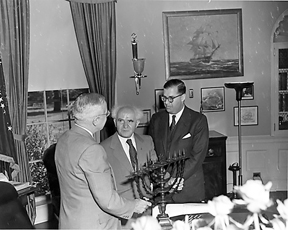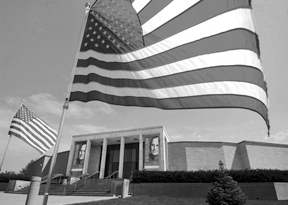
The Harry S. Truman Library and Museum is slated for a $25 million renovation, including expanded exhibits about President Harry S. Truman’s historic and controversial recognition of the then-new State of Israel on May 14, 1948.
The project is planned to coincide with the 75th anniversary in 2020 of the start of Truman’s presidency, according to a news release from the Truman Library Institute (trumanlibraryinstitute.org). Starting July 23, the library will close for about a year during the renovation. Its archives and research room will remain open to the public during the renovation. The library’s website address,trumanlibrary.org, will change to trumanlibrary.gov starting June 28.
Library Director Dr. Kurt Graham told The Chronicle that Truman’s decision to officially recognize Israel “was a very, very big decision.”
“It was something he didn’t have to do,” Graham said. “It was running up to an election, which was dicey.”
Truman had been thinking for many years about the idea of the Jewish people having a homeland, Graham said. The British government issued the Balfour Declaration during World War I, on Nov. 2, 1917, which stated its support for “the establishment in Palestine of a national home for the Jewish people.”
“Since World War I, (Truman) saw this as a promise that needed to be kept,” Graham said. “This decision to recognize Israel (caused a) split in his cabinet. He was very courageous in making this stance, and that’s what we want to highlight. You can’t pick up a newspaper today without reading headlines you can trace back to Truman. … Today’s situation with Iran and the U.S. and that oil rich region (was something that) Truman had to deal with. Many said, ‘Don’t alienate the Arabs because of oil.’ The way Truman dealt with this was critically important. … We believe there’s no better place in the U.S. to tell that story of the recognition of Israel than at the Truman Library.”
Part of the reason for doing the renovation and expansion, Graham said, is that many subject areas are underrepresented in the library. Much has happened since the library’s most recent expansion in 2001. A lot of scholarship has been done, and it’s important to update and modernize the library to reflect that.
The new exhibit on Truman’s recognition of Israel will have an entire room with cases for artifacts, text panels to tell the story and multimedia presentations recounting the process of his decision. And many children don’t know the story, Graham said.
“It’s one of the great presidential decisions,” he said. “It changed the map of the world. Had he not been president, there could’ve been different outcomes on a number of different issues. He’s consistently recognized as the fifth- or sixth-best president in U.S. history.”
The renovation and expansion will be done by museum planning and design firm Gallagher & Associates, architectural firm The Clark Enersen Partners, Monadnock Media and JE Dunn Construction. Gallagher & Associates’ prior projects include the International Spy Museum and the National World War II Museum.

The renovation will include moving the museum’s entrance to the building’s east side and expanding it with a 3,000-square-foot addition to provide “a dramatic entrance to Truman’s presidential library,” according to the release. The renovation will also include a new permanent exhibition on Truman, new amenities and enhanced educational and community programming.
“As we approach the 75th anniversary of my grandfather’s presidency, the impact of his legacy on our world is more evident than ever,” Clifton Truman Daniel, Truman’s eldest grandson and the Truman Library Institute’s honorary chairman, said in the release. “Renovating his library and museum is a fitting way to honor the leading architect of our modern democratic institutions.”
The library opened July 6, 1957. It cost $1.75 million to build, financed by donations from more than 17,000 individuals and organizations nationwide. It underwent renovations costing $310,000 in 1968, $2.8 million in 1980 and $15 million in 2001. It contains more than 16 million pages of documents, 325,000 feet of recorded film, 150,000 photographs, 32,000 artifacts, 2,600 sound recordings and 600 oral histories. As of this year, 15,000 researchers have used it.
As of June 1, more than $23 million has been raised for the project from sources including the State of Missouri, Marny and John Sherman, the Sunderland Foundation, the Hall Family Foundation, Kansas City Southern, the William T. Kemper Foundation, the National Archives and Records Administration, Jean and Tom McDonnell, the Marion and Henry Bloch Family Foundation, the Sosland Foundation, the Arvin Gottlieb Charitable Foundation and an anonymous donor.
Of the $25 million cost, $22 million will be used for the building’s renovation and the new permanent Truman exhibition, and $1 million each will be used for enhanced educational programs, expanded public programs and endowment.
The importance of Truman’s legacy for Jews in the Kansas City area and worldwide, and of the library and museum, can’t be overstated, said Karen Pack, a board member of the Truman Library Institute, past president of the Jewish Federation of Greater Kansas City and a member of the Jewish Agency for Israel’s board of governors. Pack lives in Prairie Village and belongs to Kehilath Israel Synagogue.
“I think the expanded and updated library (will give) the opportunity to the Jewish community and the greater community … and visitors from all over the world (to) be able to learn what went into Truman’s decision to recognize the new State of Israel,” Pack told The Chronicle. “One critical decision he made was to send observers to see how survivors and refugees were being treated in the refugee camps in Germany. He was appalled at what they saw, and he made sure the amount of aid sent to refugee camps was improved.”
Truman also called on Congress to expand immigration for survivors, Pack said. President Franklin D. Roosevelt’s administration had limited immigration. Truman’s action enabled thousands of people to come to the United States, and many people don’t understand why he made that decision, she said.
“President Truman was a great student of the Bible and of history,” she said. “It was not a popular decision among his cabinet members. He did the right thing for Americans and for humanity. … He put people’s lives above anything. For the Jewish people, he changed the course of history. With the expanded exhibit, people will have a deeper understanding how critical Truman was to Israel and the Jewish people.”



